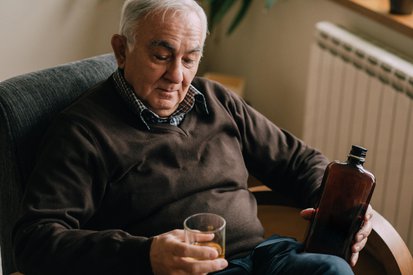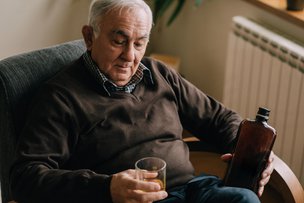
"10-15% of people don't start to drink heavily until they're older in age."
Dr. Alison Moore - UCLA Professor
Many of us enjoy a drink every so often, but when one drink becomes a *few* drinks every day, something is not quite right!
Alcohol becomes an addiction when a person consistently has a powerful, uncontrollable desire to drink. How often you drink, the effects of your drinking, and what happens when you attempt to reduce your consumption all play a role in determining whether you have cause for concern.
Does alcohol affect older people differently?
As we age our sensitivity to alcohol increases and our tolerance decreases meaning that older people feel the effects of alcohol at a faster rate.
Older people tend to have more fat & less muscle to absorb alcohol, causing the alcohol to take longer to absorb. They also have less water in their bodies because, according to research, between the ages of 20 and 80, the water retained in our bodies drops by around 15%. All of these factors contribute towards older people with alcohol addiction being at higher risk of incidents such as falls and injuries as a result of their drinking habits.
How can you spot the signs of alcohol addiction in older people?
Being able to identify the early warning signs of alcohol abuse and organising appropriate treatment can significantly assist an older person's addiction recovery. It is important to take action sooner rather than later, before an older person's alcohol problem grows out of control.
These are common indicators of elderly alcoholism:
- Drinking alone in private
- Short-term memory loss
- Distancing themselves from close ones and the things they enjoy
- Creating excuses for having a drink
- Slurred speech & scent of alcohol
- Increased health complaints
- Poor hygeine
- Change in eating habits
Why do people fall into the trap of alcoholism?
It is not always easy to identify when you or a loved one is on their way to becoming an alcoholic, which can make it difficult to stop the problem in its tracks early on. For example, they may keep their drinking habits private due to embarrassment.
Quite often, the main reason behind alcoholism is to cope with personal difficulties. People use alcohol as a way of escaping their worries...only it almost always makes matters worse. These are the most common reasons why people may become alcohol dependent:
- Financial problems - If an older person's savings are running low, they are likely to be worried about what will happen to them when they run out.
- Bereavement - The loss of a loved one, particularly a close family member, can drag people into a very dark place.
- Physical illness - Some people who suffer from an illness that causes them a lot of physical pain may become desperate for a way of alleviating the pain.
- Social isolation - It is very common for older people to suffer from loneliness & isolation, which leads to emotional pain that they struggle to control.
How can alcoholism in older people be prevented?
1. Talk about your concerns with the person you are worried about
If you are worried that an older person you know is an alcoholic, we recommend that you talk about your concerns with them. However, it is key that you consider a few things before jumping straight in. People who have an alcohol problem can often be in denial and may not even realise that they have a problem. Therefore, it is imperative that you approach the subject sensitively.
Tips:
- Choose a time to speak with them when they are sober so that they can comprehend what you are saying. There's no use in having a conversation with them whilst they are intoxicated as they are likely to forget.
- Pick your words wisely whilst you are having a conversation about alcohol with your older friend or relative. You want to be careful not to say anything that may offend them in any way or cause an argument.
- Discuss what you have observed with them as this could help them to understand why you are worried about their welfare.
- Keep the conversation short and sweet. There may be a lot for your loved one to think about and you don't want to overwhelm them. The conversation can be revisited once they have had time to digest everything.
2. Take action
If you have a valid reason to think that your relative is addicted to alcohol, it's best not to delay in taking action before the problem gets worse. There are several things that you can do to help your older relative, including the following:
- You can book GP appointments for your older relative and better still you can accompany them to the appointment if they will allow you to. You will be able to give the GP a better representation of the signs of alcoholism your older relative is demonstrating so it would be useful for you to be present during appointments. There is also the risk of your older relative playing down their symptoms if they attend appointments alone. Visiting a GP will get the ball rolling with getting treatment for your loved one.
- There's a chance that your older relative will be reluctant or even refuse to seek help for their addiction. In this instance you could make an appointment to see a specialist who will be able to help you come up with a plan of action to help your older loved one.
- You can request support from OK Rehab who offer help for addiction in the UK. On their website, you can leave your details to receive a call back to discuss the specific help they offer depending on your situation.
IMPORTANT ADVICE:
- Although it may be tempting, resist throwing out your older relatives alcohol supply - doing this can lead to unhelpful conflict, or even deadly withdrawal symptoms.
- Prevent them from driving - drink driving puts both your loved one and everyone else at risk and therefore should be avoided whilst your loved one is going through alcohol addiction. Offer to give them a lift or arrange alternative transport for them such as a taxi.
- Remember to look after yourself! Having a loved one who is showing signs of alcoholism can be a very stressful time so it is important that you seek support from other family members, or even join a support group for others in the same situation as you.
What are the treatments for alcohol addiction?
- Detoxification - The GP will likely prescribe medication which will help to alleviate withdrawal symptoms. For an older person, the GP may arrange for this to be done at the hospital. After a few days/weeks the medication will be tailed off.
- Psychological - This type of treatment may be given individually or in a group depending on what has been recommended for your older relation. Talking to a professional or others who are going through the same thing may encourage your loved one to open up about how they are feeling.
-
Support groups - These are groups often run by charities that aim to provide a support network for people who are going through a tough time in their lives. They bring together people who are trying to achieve the same goal - in this instance, getting over their alcohol addiction. Here are a few support groups for alcoholics:
- Age UK - Age UK offers a free advice line 365 days a year for older people and their families for any issues they may have.
- Alcoholics Anonymous - The AA provides a free advice line for people with drinking problems as well as meetings.
Can alcoholism reduce a person's life expectancy?
The answer is yes. According to CNN Health, "Drinking more than 100g of alcohol per week, equal to 5 or 6 glasses of wine in the UK, increases your risk of death from all causes and in turn lowers your life expectancy", and "Excessive drinking, including binge drinking, can cause more than 200 kinds of diseases and injuries." Just a few examples of how drinking can affect life expectancy are drink driving leading to crashes, drowning due to impaired responses and assaults due to irritability & mood swings.
Excessive drinking can eventually lead to the following health problems:
- Brain damage
- Immune system disorders
- Cancer
- Liver damage
If you know of an older person who you believe has an alcohol addiction, please don't delay in taking action. Excessive drinking can be detrimental to their health, so their problem must be stopped in its tracks before it's too late.
Do you have a relative who needs care? Please contact us today for complimentary support in finding suitable care services.
Call us on 01865 638018
Send message

